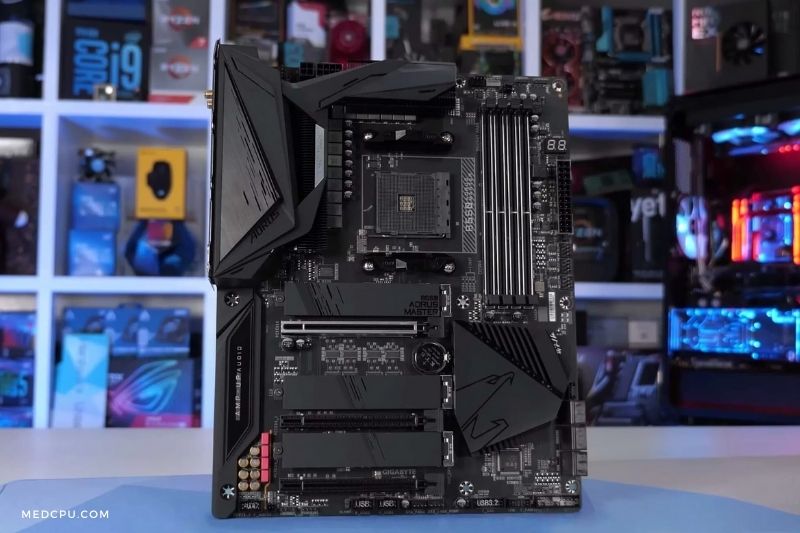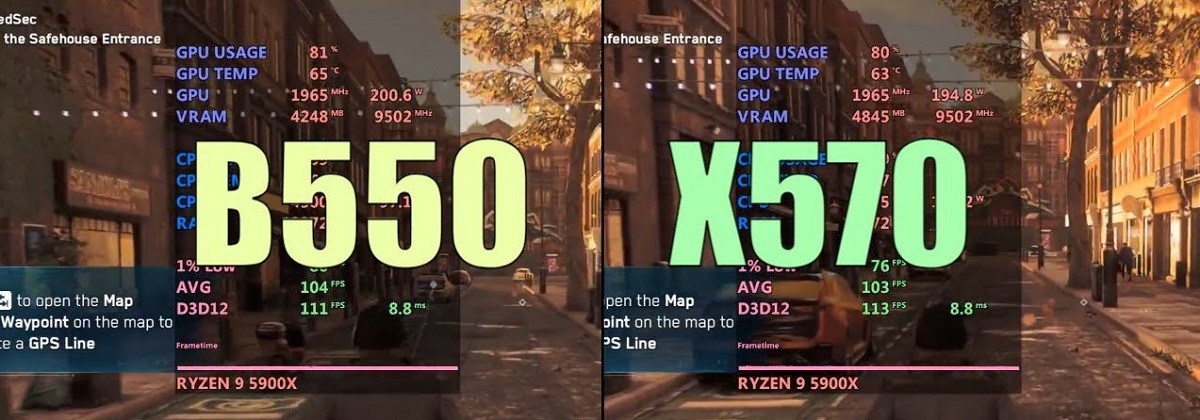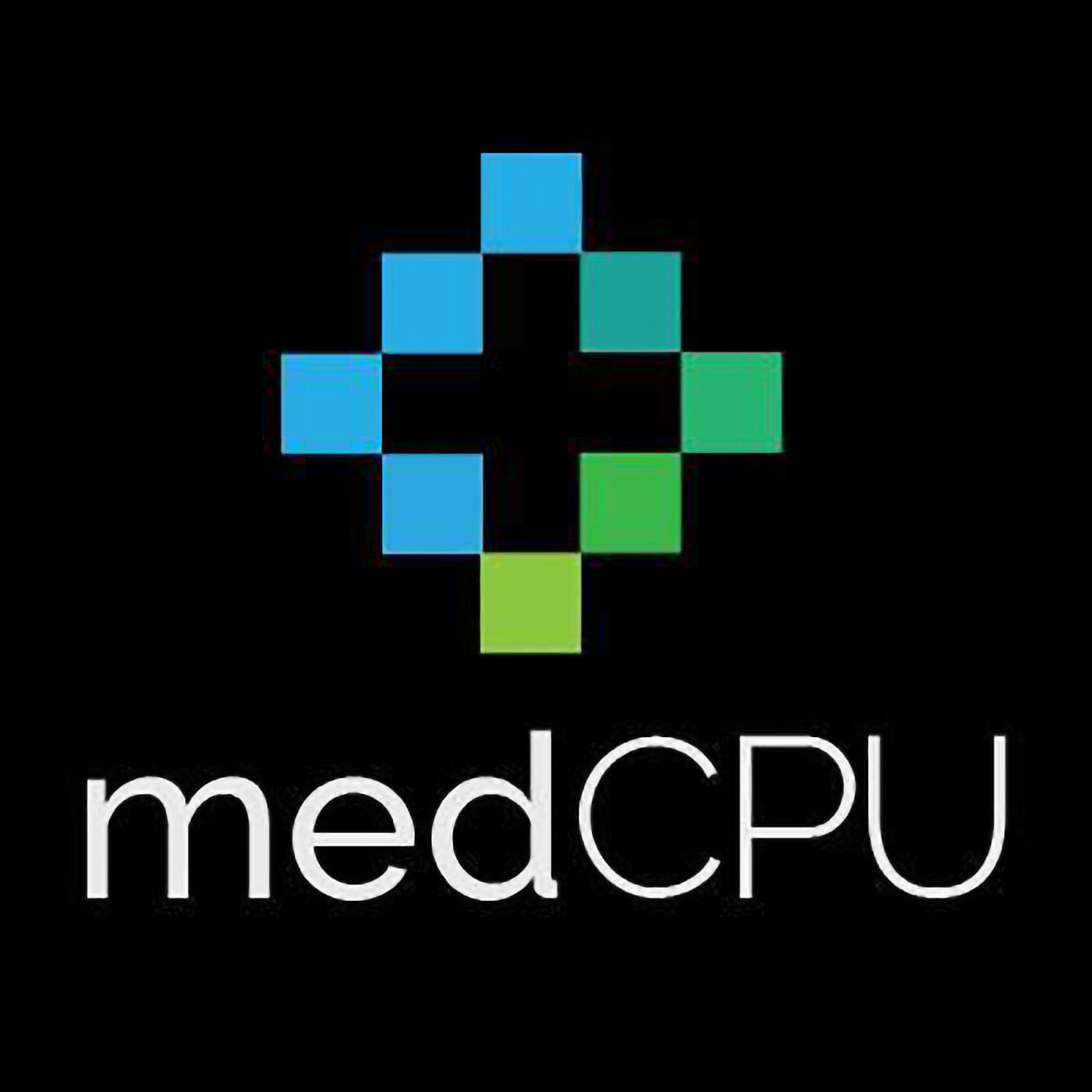Choosing the right motherboard for your gaming PC can be a challenging decision, especially when it comes to AMD chipsets like B550 vs X570. I’ve been there too, caught in the middle of tech specifications and endless online comparisons.
Luckily for you, I’ve done my homework to simplify all that information into bite-sized portions anyone can understand. In this post, medCPU will deep dive into what these chipsets are, their crucial differences, and the advantages each holds – guiding you towards making an informed choice tailored to your needs.
Ready? Let’s decode this puzzle together!
What is a Chipset?
Every computer motherboard contains a chipset, a physical chip situated somewhere on the board. The motherboard serves as the vital connection hub that enables seamless communication between various components such as the CPU, RAM, graphics card, and more, with the chipset playing a defining role in this process.
The chipset determines the essential capabilities of the motherboard, including the number of supported RAM sticks and video cards, the maximum speed at which the RAM can operate, the quantity and speed of USB ports available, the number of PCIe lanes supported, and other features.
When comparing two similar chipsets, like the B550 and X570, many capabilities will be shared. However, there will be some differences; for instance, one chipset might offer more high-speed USB ports and PCIe lanes than the other.
It’s worth noting that some motherboard implementations might not utilize the full extent of their chipsets’ capabilities. Nevertheless, comprehending the chipset in use is a quick and effective method of assessing the potential capabilities of a motherboard.
AMD B550 vs X570: Supported CPUs
| B550 Chipset | X570 Chipset | |
| AMD Ryzen 7000-series CPUs | x | x |
| AMD Ryzen 5000-Series CPUs | v | v |
| AMD Ryzen 4000-Series CPUs | v | v |
| AMD Ryzen 3000-Series CPUs | v | v |
| AMD Ryzen 2000-Series CPUs | x | v |
AMD’s B550 and X570 chipsets belong to the latest generation of chipsets and are specifically designed to complement some of the best gaming CPUs available on the market, such as AMD’s Ryzen 5000-series processors.
Both the B550 and X570 chipsets offer backward compatibility with AMD Ryzen 3000-series and 4000-series CPUs since they support the AM4 socket CPUs. This means that if you have, for example, an AMD Ryzen 5 3600 CPU, it should work seamlessly with either chipset.
While X570 chipset motherboards are also compatible with AMD Ryzen 2000-series CPUs, B550 chipset motherboards, unfortunately, do not support these older CPUs.
It’s important to note that both B550 and X570 chipsets utilize the AM4 socket. However, AMD’s upcoming generation of desktop processors, the AMD Ryzen 7000-series CPUs, will make use of the new AM5 socket. Consequently, B550 and X570 chipset motherboards will not be able to run the next-generation AMD CPUs.
AMD B550 vs X570: Specs
| AMD B550 Chipset | AMD X570 Chipset | |
| Usable PCIe 4.0 Lanes | 20 | 36 |
| Usable PCIe 3.0 Lanes | 10 | 0 |
| Chipset Lane | PCIe 3.0 (x4) | PCIe 4.0 (x4) |
| SATA III Ports | 8 | 14 |
| USB 3.2 Gen 2×1 Ports | 6 | 12 |
| USB 3.2 Gen 1×1 Ports | 2 | 0 |
| USB 2.0 Ports | 6 | 4 |
| Overclocking | v | v |
| LAN | 2.5G | 10G |
Both the B550 and X570 chipsets provide ample capabilities for the majority of PC gamers using current- or previous-generation AMD CPUs.
It’s important to note that the specifications mentioned earlier are theoretical maximums and may have various interpretations. For instance, using all the SATA ports that the chipset can theoretically support might require sacrificing some PCIe lanes. Both chipsets offer a lot of flexibility in mix-and-match configurations, especially the X570.
However, in simpler terms, all B550 and X570 chipset motherboards should allow users to run one graphics card in a PCIe 4.0 x16 slot and one PCIe 4.0 NVMe SSD in an M.2 expansion slot. These features should suffice for most gamers’ needs.
Moreover, both chipsets offer more than enough LAN bandwidth and come with a wide array of USB ports, including USB 3.2 Gen2, USB 3.2 Gen1, and USB 2.0 ports, ensuring users have a diverse selection of connectivity options.
Differences Between B550 and X570
The B550 and X570 chipsets differ in terms of PCIe support, dual GPU support, USB and SATA connections, overclocking capabilities, and price.
PCIe support
Diving into PCIe support, it’s noteworthy that both B550 and X570 chipsets have made significant strides in this department. The X570 is known for its full support of the latest PCIe 4.0 interface, which doubles the bandwidth available from the previous generation.
You can expect faster data transfer rates; ideal for high-performance GPUs or NVMe SSDs that utilize this technology.
In contrast, the B550 also offers some level of PCIe 4.0 compatibility but is restricted to a single slot only—typically dedicated to your primary GPU or M.2 drive. However, don’t underestimate this chipset as it’s more than capable of handling most mainstream tasks while striking a balance between performance and cost-effectiveness.
Dual GPU support
Stepping into the realm of enhanced gaming performance, both B550 and X570 motherboards are quite impressive with their capability to support dual-GPU. Known as Nvidia SLI or AMD Crossfire in technical parlance, this feature enables you to harness power from two graphics cards simultaneously.
For gamers and heavy-duty users, this is a tremendous boost in terms of visual quality and smoothness. However, there’s a key distinction between these two chipsets when it comes to Dual GPU support — while every model on the top-tier X570 lineup boasts this feature, only certain high-end B550 boards present an offer for such an upgrade.
Thus, if the multi-GPU operation is what you’re after, Intel’s X570 could be your go-to choice unless you’ve got your eyes on one of those premium B550s that checks all your boxes.
USB and SATA connections
When comparing the B550 and X570 chipsets, one important factor to consider is the differences in USB and SATA connections. Both chipsets offer powerful connectivity options for various devices, but there are variations in terms of types and quantities of ports available.
The X570 chipset supports up to 8 USB 10Gbps ports, providing a greater number of higher-speed ports compared to the B550 chipset. Additionally, both chipsets have native support for 4x SATA III (6Gbps) ports.
However, neither chipset supports SATA Express or Gen2 general-purpose lanes. These differences in USB and SATA connections can influence your decision when choosing between B550 and X570 based on your specific needs and budget considerations.
Price
When comparing the B550 and X570 chipsets, one important factor to consider is price. The cost difference between these two chipsets can vary significantly depending on the specific motherboard model and brand.
Generally, X570 motherboards tend to be more expensive than their B550 counterparts due to the additional features and capabilities they offer. However, it’s worth noting that B550 chipsets are often considered more cost-effective for gamers who don’t require all the advanced features of the X570 chipset.
So, if you’re on a tighter budget but still want solid performance for your gaming PC build, opting for a B550 motherboard could be a smart choice.

Should you Buy a B550 or X570 motherboard?
The specifications of the B550 and X570 chipsets primarily represent their theoretical maximum capabilities. To understand the practical performance, one should compare the specific implementations made by individual motherboard manufacturers.
The key difference between AMD’s B550 and X570 chipsets is that the X570 offers more higher-speed ports and lanes. This allows for the potential to run more components and peripherals through PCIe 4.0, SATA III, and USB 3.2 Gen 2×1 connections.
However, for most gamers, will likely only utilize a few PCIe 4.0 lanes, which both B550 and X570 offer – typically for the graphics card and one M.2 NVMe SSD. Additionally, most gamers won’t require an abundance of high-speed USB ports. Both chipsets should offer similar levels of CPU, GPU, RAM, and single SSD performance, and they both support overclocking.
For the majority of gamers, opting for a cheaper B550 motherboard would be a more practical choice. If you only need a standard gaming setup, a B550 motherboard will provide everything you need.
On the other hand, if you anticipate using multiple PCIe 4.0 expansion cards, high-speed storage devices, or require numerous high-speed USB connections, then an X570 motherboard might offer a more suitable solution.
Considering gaming performance
As someone who values gaming performance, it’s important to carefully consider the differences between the B550 and X570 chipsets. The X570 chipset is generally considered slightly superior in terms of overall features and connectivity, offering more PCIe 4.0 lanes and faster Input/Output speeds than the B550 chipset.
This means that if you’re looking for maximum performance and flexibility, the X570 might be your best bet. However, it’s worth noting that both chipsets support RAM and CPU overclocking, allowing you to fine-tune your system for optimal gaming performance regardless of which one you choose.
Ultimately, your choice will depend on the specific features and connectivity requirements that matter most to you as a gamer.

Future-proofing considerations
When deciding between the B550 and X570 chipsets, it is important to consider future-proofing. The X570 chipset is often regarded as more future-proof due to its support for PCIe 4.0. This means that it can provide faster data transfer speeds and better performance with compatible devices.
However, it’s worth noting that not everyone may require this level of future-proofing, especially if they don’t have a need for multiple high-speed devices or graphics cards. On the other hand, the B550 chipset offers backward compatibility and APU compatibility, which can be advantageous in terms of cost-effectiveness and flexibility.
Ultimately, the decision between B550 and X570 should be based on individual needs and preferences rather than simply assuming that one chipset is automatically superior in terms of future-proofing.
Pricing comparison
When comparing the pricing of B550 and X570 chipsets, it’s important to consider your budget and specific needs for your gaming motherboard. The B550 chipset generally offers a more budget-friendly option, making it suitable for those looking to build a high-performance PC without breaking the bank.
On the other hand, X570 motherboards tend to have a higher price point due to their top-tier features and capabilities. However, it’s worth noting that pricing can vary depending on specific models and brands within each chipset category.
So, be sure to compare prices and features carefully to find the best value for your money when choosing between B550 and X570 chipsets for your gaming rig.
Overall value for money
When considering the overall value for money of the B550 and X570 chipsets, it ultimately comes down to individual needs and budget. The B550 chipset offers a more budget-friendly option without compromising too much on performance or features.
It provides backward compatibility with previous generation CPUs, APU compatibility for integrated graphics solutions, and in-built motherboard cooling for better temperature management. Additionally, the abundance of PCIe 4.0 lanes allows for future expansion possibilities.
On the other hand, the X570 chipset is considered premium and offers an array of advanced features and connectivity options. It boasts PCIe 4.0 slots and M.2 support for lightning-fast storage speeds, power stability for high-end processors, superior cooling capabilities to ensure optimal performance even under heavy loads, and greater support for USB 3.2 Gen 2 ports.
Conclusion
In conclusion, when it comes to choosing between the B550 and X570 chipsets, it ultimately depends on your specific needs and budget. The X570 chipset offers more premium features and connectivity options, making it ideal for high-end gaming builds.
However, if you’re looking for a budget-friendly option with solid performance and backward compatibility, the B550 chipset is a great choice. Consider your priorities in terms of PCIe support, overclocking capabilities, and future-proofing to make an informed decision.
Both chipsets have their advantages and drawbacks, so choose wisely based on your individual requirements.
Related Posts:

Eyal Ephrat serves as the co-founder and CEO of medCPU.com, where technology is making significant strides in the field of medicine. Through his experience in purchasing PC and laptop equipment and various other tech products, Eyal Ephrat contributes valuable insights to medCPU’s mission.
